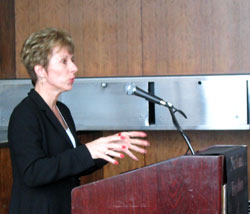In address to FOI Summit, former USA Today reporter Toni Locy argues that the First Amendment "needs some help."
by Aimee Edmondson, NFOIC contributing writer
It’s time for journalists to band together and fight harder for a national shield law, said a former USA Today reporter who for years never saw the need for such protection.
But now Toni Locy is facing fines as high as $5,000 a day and jail time for refusing to identify her sources for stories about the 2001 anthrax attacks. She used to think the First Amendment was strong enough to protect journalists’ information gathering.
“The First Amendment needs some help,” Locy said. “It's time to stop running. It's time to turn and fight. If we don't fight for the First Amendment, who will?”
A journalism professor at her alma mater, West Virginia University, and soon to leave WVU to join the faculty of Washington & Lee University, Locy was speaking at the National Freedom of Information Coalition’s 2008 FOI Summit in Philadelphia.
 Professor of journalism and former journalist Toni Locy Locy delivers the keynote address after Saturday's luncheon at the 2008 FOI Summit on May 10. Locy has appealed a U.S. District Court order to hand over her sources relating to stories about former Army scientist Steven Hatfill, who was “a person of interest” after the 2001 anthrax attacks. Professor of journalism and former journalist Toni Locy Locy delivers the keynote address after Saturday's luncheon at the 2008 FOI Summit on May 10. Locy has appealed a U.S. District Court order to hand over her sources relating to stories about former Army scientist Steven Hatfill, who was “a person of interest” after the 2001 anthrax attacks. |
Locy has appealed a U.S. District Court order to hand over her sources relating to stories about former Army scientist Steven Hatfill, who was “a person of interest” after the attacks. Hatfill sued government officials for violating his privacy by talking to reporters.
Locy says she can’t remember which confidential source gave her the specific information Hatfill is seeking for his civil suit because she routinely talked to as many as a dozen sources in the Justice Department and the FBI. Typically she would run through a litany of questions for each one. Now she can’t remember exactly what information she got from each particular source.
“I have no notes to refresh my recollections,” Locy said. “I was taught to always discard my notes.”
In covering the Justice Department’s day-to-day operations, Locy said she would not have been able to do her job effectively with on-the-record-only sources. If Locy is required to reveal her sources, she said, this could put an end to reporters covering ongoing investigations.
“We cover crime from start to finish and all points in between,” said Locy, whose career includes reporting for the Boston Globe, Washington Post, U.S. News & World Report and the Associated Press.
“We hold the FBI accountable now. We don’t wait until someone is tried and convicted,” she said. One of her stories that is of particular interest to Hatfill and his attorneys is a May 23, 2003 story about the FBI’s 24-7 surveillance of him.
At USA Today, Locy covered the Sept. 11, 2001 terrorist attacks and aftermath, including the Bush administration’s policies on terrorism suspects detained at Guantanamo Bay and elsewhere. She has long relied on “insiders” who may be “upset about abuses and misuse of the law” on the part of the government.
“We have allowed the purveyors of secrecy to define our own terms. This is our mistake,” she said.
Locy also lamented newspaper executives’ “panic” regarding the use of anonymous sources, pointing to Jason Blair and Jack Kelley, who faked their sources and damaged all reporters’ credibility.
“I know I sound combative. I am frustrated with my own business,” Locy said. “The confidential source is a tool of our trade.”
